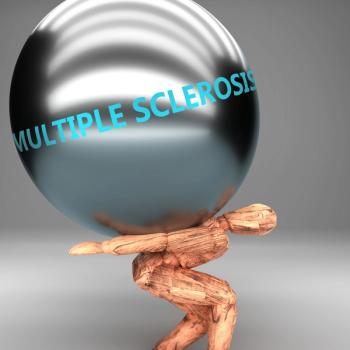
Neurologists may feel ill-equipped to manage or identify sexual problems of multiple sclerosis patients, wrote the authors, but it's important they ask patients about sexual function and satisfaction.

Neurologists may feel ill-equipped to manage or identify sexual problems of multiple sclerosis patients, wrote the authors, but it's important they ask patients about sexual function and satisfaction.

But transcutaneous electrical nerve stimulation (TENS) edged out interferential current therapy (IFT) on several measures.

The Multiple Sclerosis International Federation has applied to have Rituxan, Mavenclad and Copaxone added to the World Health Organization’s list of essential medications.

The newly approved treatment for relapsing multiple sclerosis is priced at $59,000 per year. The Institute for Clinical and Economic Review said it should be priced at between $16,000 and $34,900 to meet commonly accepted thresholds for cost effectiveness.

Findings presented at the 2023 Americas Committee for Treatment and Research in Multiple Sclerosis (ACTRIMS) were the first to compare the two drugs for relapsing-remitting multiple sclerosis.

Rituximab is cheaper and just as effective as the other monoclonal antibodies used to treat MS, says an ICER report that came out today.

Cerebral organoids shed light on cells that generate the myelin cells that protect the axons of neuron. In multiple sclerosis, inflammatory processes attack the myelin of neurons in the brain and spinal cord.

Some people with multiple sclerosis follow dairy-free or plant-based diets that may be low on calcium and vitamin D.

The new law raises the age threshold for the onset of disabling conditions that make people eligible to have the savings accounts. The money in the accounts do not count toward the limits for Medicaid and the Supplemental Nutritional Assistance Program.

Spanish researchers found that progression of multiple sclerosis that was independent of relapses of the disease was associated with worse long-term outcomes.

A study by Kaiser Permanente researchers found that the overall the risk of COVID-19-related hospitalization was low in vaccinated individuals with multiple sclerosis, regardless of whether participants had received Rituxan treatment. Still, the findings suggest that spacing out vaccination may offer added protection against COVID-19.

Researchers used a Fitbit Flex2 to examine the correlation between step counts and changes in the brain and spinal cord associated with multiple sclerosis.

The monoclonal antibodies that treat patients with multiple sclerosis would have to be priced more than 50% lower to meet the common standards of cost-effectiveness, according to the Institute for Clinical and Economic Review.

A recently published review paper looked at microRNAs, which play a key role in gene expression. Much more research is needed, the researchers concluded, to fill in the gaps of how microRNAs might be used to monitor how people with multiple sclerosis (MS) response to the growing number of MS treatments.

Evidence that people with multiple sclerosis (MS) benefit from exercise is accumulating researchers should be careful about using standard definitions of exercise and start collecting and reporting data on adverse event, says the National MS physical wellness research working group.

Results of research by Swiss investigators show effector memory T cells bounce back quickly after autologous hematopoietic stem cell transplantation.

Brain imaging technique may shed light on the clinical-radiological paradox of multiple sclerosis: structural damage in the brain related to the disease does not necessarily predict clinical disability.

Research has linked obesity to an increased risk of getting multiple sclerosis. This German study examined whether there is a link between obesity and severity of the disease.

A small, preliminary study suggests that multiple sclerosis patients might be monitored based on the speed for their smartphone use.

Findings may support the development of an aerobic exercise training intervention for people with multiple sclerosis (MS) who present with MS-related thalamic atrophy.

A Carnegie Mellon researcher and colleagues used data from smartphones and fitness trackers to build machine learning models to predict depression, fatigue, poor sleep quality and worsening multiple sclerosis symptoms.

A Novartis-funded analysis gives the Novaritis MS drug the nod based on a model using efficacy and safety data.

The link between higher multiple sclerosis rates and distance from the equator has commonly been explained by vitamin D levels. A new analysis from Johns Hopkins researchers suggests the association may also be linked to healthcare spending and the resources needed to diagnose disease.

Research conducted in Canada suggests that people with multiple sclerosis would benefit from being seen by nurse practitioners. However, secondary outcomes in the study did not improve among patients with access to nurse practitioner-led care.

Sandoz has filed an application for a biosimilar to the blockbuster multiple sclerosis drug. It is not clear when it will be on the market.